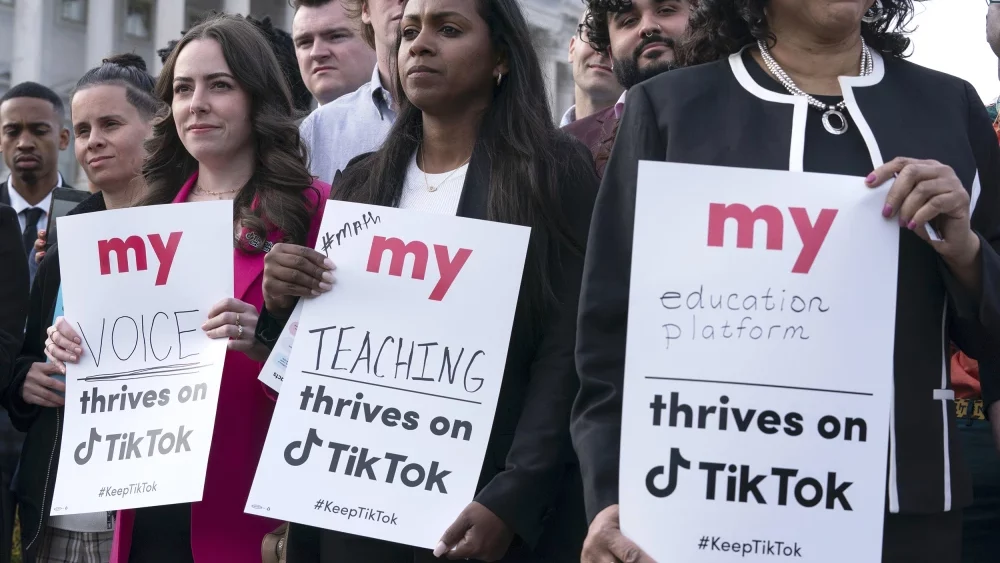Today’s News

Image Source: NBC News
The House of Representatives resoundingly passed a bill on Wednesday aimed at banning TikTok from operating in the U.S. or mandating its sale, setting the stage for a crucial Senate showdown. The vote, with a tally of 352 to 65 and one member voting present, underscored bipartisan support for regulating the app. This move brings Congress closer to an unprecedented ban on one of America’s most popular apps, with legislators grappling with national security concerns, freedom of speech issues, and the potential impact on users and businesses.
TikTok has come under scrutiny for its algorithm, which influences content selection on various topics, from sensitive issues like teen mental health to global conflicts such as the Israel-Hamas war. Officials argue that TikTok’s Chinese ownership raises concerns about data privacy and potential manipulation by Beijing. Lawmakers have made repeated attempts to rein in the app over the years.
Rep. Mike Gallagher (R., Wis.), a co-author of the bill along with Rep. Raja Krishnamoorthi (D., Ill.), emphasized the need for a change in TikTok’s ownership structure: “TikTok cannot continue to operate in the United States under its current ownership structure.”
The bill now moves to the Senate, where lawmakers share similar concerns but may take a more cautious approach. Senate Majority Leader Chuck Schumer (D., N.Y.) declined to commit to bringing the bill for a vote, indicating a need for further consultation.
Opponents of the bill raised concerns about free speech and government interference in business operations. The legislation requires ByteDance, TikTok’s parent company, to divest itself of the app within six months of the bill’s enactment or face a ban from app stores and web-hosting services in the U.S.
However, some lawmakers expressed sympathy for TikTok’s challenges, arguing that the legislation could have unintended consequences for businesses and users. Rep. Sydney Kamlager-Dove (D., Calif.) voiced concerns about federal overreach, emphasizing the need for a more thoughtful approach to national security issues.
Despite these concerns, most lawmakers support a sale as a viable solution. Rep. Nancy Pelosi (D., Calif.) stressed that the aim is not to ban TikTok but to improve it, echoing the sentiment that the bill focuses on conduct rather than content.
Critics of the bill argue that TikTok has taken steps to address security concerns, such as storing U.S. user data locally. TikTok spokeswoman Jodi Seth labeled the bill a “ban based on zero evidence,” urging the Senate to consider its impact on businesses and users.
Senate dynamics remain uncertain, with questions about floor time and potential amendments. Sens. Mark Warner (D., Va.) and Marco Rubio (R., Fla.) supported the House bill, citing concerns about TikTok’s influence and data security.
TikTok has ramped up its lobbying efforts in Washington to fight the potential ban, but lawmakers remain skeptical. Despite facing a formidable lobbying campaign, many legislators remain firm in their support for regulating TikTok’s operations in the U.S.
As the Senate deliberates on the bill’s fate, the future of TikTok in the U.S. hangs in the balance, with millions of users and businesses closely watching the outcome.
Other News
JPMorgan Welcomes ETF Expert Jon Maier
JPMorgan Asset Management hires Jon Maier, a seasoned ETF strategist, following his departure from Global X amidst executive shake-ups. Maier will lead the new ETF Insights division, reinforcing JPMorgan’s burgeoning USD 160bn ETF business.
Goldman Grapples With Gender Disparity In Senior Roles
Despite pledges to elevate women to senior positions, Goldman Sachs faces criticism as top female talent exits, citing better opportunities elsewhere. Currently, no woman leads a major division, signaling ongoing challenges in gender diversity efforts.
Debenhams Pension Plan Benefits Restored In Superfund Deal
Over 10,000 Debenhams pension plan members will have their retirement benefits restored as the scheme moves to Clara Pensions, marking a significant milestone for U.K. pensions. Clara aims to secure full buyout within five to ten years.



